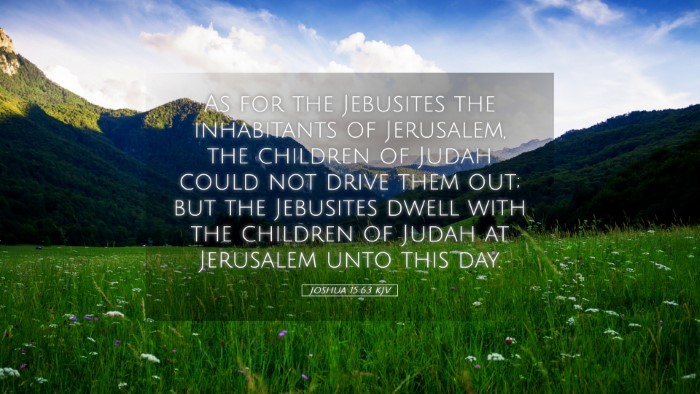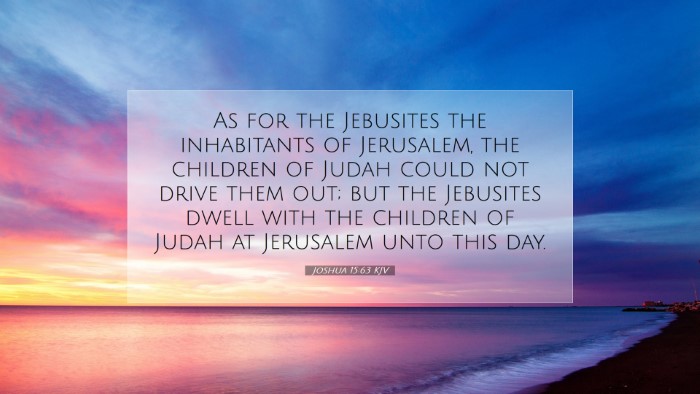Bible Commentary on Joshua 15:63
This verse reads:
“But the Jebusites, the inhabitants of Jerusalem, the children of Judah could not drive them out: but the Jebusites dwell with the children of Judah at Jerusalem unto this day.”
Introduction
The book of Joshua serves as a crucial narrative in the Old Testament, chronicling the entry of the Israelites into the Promised Land following their desert wanderings. In this context, Joshua 15:63 sheds light on the challenges faced by the Israelites in fully possessing the land allocated to them, particularly highlighting their struggle against the Jebusites in Jerusalem. This commentary synthesizes insights from renowned commentators such as Matthew Henry, Albert Barnes, and Adam Clarke.
Contextual Background
The chapter outlines the territory given to the tribe of Judah, which included significant cities and regions. The mention of the Jebusites, who inhabited Jerusalem, reveals the resistance the Israelites encountered while attempting to take possession of the land. The failure to drive out the Jebusites is a recurring theme reflecting the incomplete conquest of Canaan.
Exegesis of the Verse
Meaning of the Jebusites
According to Matthew Henry, the Jebusites were a formidable tribe that had established a stronghold in Jerusalem, a city of great importance. Their presence not only symbolizes the physical resistance faced by the Israelites but also points to spiritual implications. The inability to drive them out signifies a failure to achieve complete obedience to God's command regarding the conquest of Canaan.
The Inhabitants of Jerusalem
Albert Barnes emphasizes that Jerusalem’s historical significance elevates the gravity of this verse. It foreshadows the challenges that would continue to plague Israel through their history, serving as a metaphor for challenges believers face in spiritual warfare against entrenched sins or opposition.
Children of Judah
The designation 'children of Judah' introduces the notion of identity and heritage among the Israelites. Adam Clarke elaborates that this struggle is emblematic of the broader conflicts inherent in human endeavors to fulfill divine purposes. While Judah was a prominent tribe, they were still unable to claim complete victory, which serves as a reminder of both human limitations and the necessity of divine assistance.
Theological Implications
Incomplete Conquest
The verse reveals a theological principle: the incomplete conquest foreshadows the struggles inherent in the Christian life. Just as the Israelites failed to remove all enemies from the Promised Land, Christians may find themselves wrestling with sin and opposition that persists despite initial victories. Matthew Henry comments on how this serves to instruct believers about the need for persistence and reliance on God, who ultimately holds the victory.
Spiritual Warfare
Albert Barnes draws attention to the idea of spiritual warfare, emphasizing that the challenges in physical conquests parallel the spiritual battles that Christians face today. Behavioral patterns, entrenched sins, and societal challenges are akin to the Jebusites: they may refuse to leave, requiring ongoing effort and warfare.
Continuity of Presence
Clarke notes the significance of the phrase “unto this day,” implying a long-standing presence that could potentially lead to spiritual complacency among the Israelites. This aspect stresses the necessity for vigilance in one's spiritual life lest one becomes comfortable with cohabitation of righteousness and unrighteousness.
Historical Significance
The historical context of this struggle is crucial. Jerusalem would later become the city of David and a central place of worship, emphasizing the importance of conquering it. Matthew Henry reflects on how the failure to conquer the city during Joshua’s time would have lasting implications for Israel's history and faith.
Practical Applications
Lessons in Faithfulness
This passage calls for introspection among believers regarding their own lives. Are there areas where they have allowed the “Jebusites” to remain, compromising their spiritual integrity? As stated by Adam Clarke, believers are challenged to confront their spiritual battles with faith and perseverance.
Encouragement in Struggle
For pastors and leaders, this commentary reassures them that struggles are part of the faith journey. It is important not to become discouraged when facing resistance but to remain steadfast in seeking God’s guidance and strength. Barnes encourages the faithful to remember that victory is assured through sustained efforts and reliance on God.
Conclusion
In summary, Joshua 15:63 provides a multi-faceted exploration of Israel's challenges in the conquest of Canaan. By analyzing the dynamics of the Jebusites and their continued presence among the Israelites, believers are reminded of the complexities of spiritual warfare, the necessity for diligence, and the importance of relying on God's power for ultimate victory. The insights from Matthew Henry, Albert Barnes, and Adam Clarke collectively contribute to a deeper understanding of this scripture, propelling pastors, students, and theologians toward meaningful applications in their spiritual lives and leadership.


